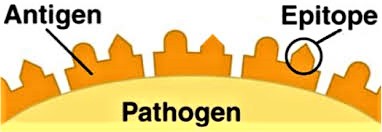Epitope Predicting Algorithm Services for Vaccine Design
Epitope-focused vaccines not only specifically stimulate protection-related immune responses, but also have less dependence on the induction of conformation-specific antibodies than intact antigen macromolecular vaccines, as well as the lower possibility of denaturation and loss of activity, which therefore avoid the requirements of cold-chain transportation. Creative Biolabs brings together outstanding scientists from the fields of bioinformatics, immunology, and vaccinology worldwide to integrate and optimize numerous epitope prediction methods and have successfully built an epitope predicting algorithms (SepaMatrix) with superior performance which could definitely help vaccine researchers better design vaccines, saving time and money as well as freeing labor!

Upstart in Vaccine Design - Epitope-focused Vaccine
Traditional whole pathogens vaccines or subunit vaccines that derived from pathogens have the advantages of simple preparation, high immunogenicity, and the ability to induce the robust production of antibodies, but for some pathogens, vaccines prepared in the traditional manner often fail to provide protection, sometimes even cause serious side effects. There are many reasons for the ineffectiveness of traditional vaccines for certain pathogens, such as the variability of antigens in pathogens, as well as the uncertainty of targets that cause protective immunity in pathogens. The rise of reverse vaccinology and structural vaccinology has enabled us to clearly define pathogen-specific antigens and is, therefore, able to design vaccines targeting these antigens. It is a groundbreaking method to identify and further to utilize individualized, potentially vital pathogen-specific epitopes by vaccination epitope-focused immunogens. Epitope-focused vaccination specifically induces critical immune responses against neutralizing epitopes, avoiding the production of antibodies that are not protective or even harmful. In addition to being attractive in being used as preventive vaccines, epitope-focused vaccines are also capable of eliciting a specific neutralizing mAb-like antibody response that rapidly alleviates the severity of the postexposure disease caused by infectious pathogen. Furthermore, epitope vaccines also have advantageous applications in cancer vaccines and cancer therapies.
Epitope Predicting
What is important to design an epitope-focused vaccine is to focus on the prediction and determination of epitopes associated with immune protection in pathogens. Since the prerequisite for T cell recognition is the epitope presented on the MHC molecule, prediction of the binding ability of the candidate epitope to the MHC molecule is an important principle for predicting T cell epitopes. But the fact is that all T cell epitopes can bind to MHC molecules well, but not all molecules that capable of binding to MHC molecules can be designed as vaccines for T cell epitopes, so prediction of epitopes needs to be considered comprehensively. The most efficient approach for predicting T cell epitopes up to date is data-driven. After clarifying the issue of specific binding of the peptide to class I or class II MHC molecules, epitopes can be predicted using bioinformatics techniques. Multiple epitope prediction algorithms are constructed up to now using peptide sequence data and experimentally determined affinity data.
The development of bioinformatics and its combination with a large amount of experimental data have greatly promoted the study of immunology and the birth of immunoinformatics. As a branch of bioinformatics, immunoinformatics uses in silico analysis methods to model immune data and problems and to analyze and predict epitopes, paratope, antigen-antibody affinity, etc. in a high-throughput manner.
More and more analytical algorithms have been established and performed well in predicting epitopes. These methods can be divided into two broad categories: 1) sequence-based approaches such as motif search-based approach, artificial neural networks (ANNs), support vector machine (SVM), Hidden Markov models, quantitative matrices-driven methods; 2) structure-based analytical methods such as docking of peptides and screening of peptide libraries, threading algorithms, binding energy and molecular dynamics.
Creative Biolabs assembles excellent bioinformatics scientists and immunologists, integrates the advantages of multiple epitope predicting algorithms and optimizes them, and creatively establishes a Superior Epitope Predicting Algorithm (SepaMatrix), whose performance in epitope predicting is far more powerful than other algorithms of its kind.
Our Services
- Excellent predictive algorithm
- Design of epitope-focused vaccine
- Design and optimization of formulation in epitope-focused vaccine
- Vaccine immunogenicity evaluation at kinds of stages
- Small- or large-scale vaccine manufacturing
Data analysis has gained explosive applications in all walks of life, and it is no exception in the vaccine industry. As a new vaccine design idea, using algorithms to predict vaccine epitopes can avoid many of the problems caused by traditional vaccines, and can greatly save time and reduce labor intensity. Based on the advantages of traditional vaccines, Creative Biolabs continues to absorb cutting-edge advanced technologies and establish original and excellent epitope predicting algorithms to provide vaccine researchers with the most valuable analysis.
All of our products can only be used for research purposes. These vaccine ingredients CANNOT be used directly on humans or animals.


